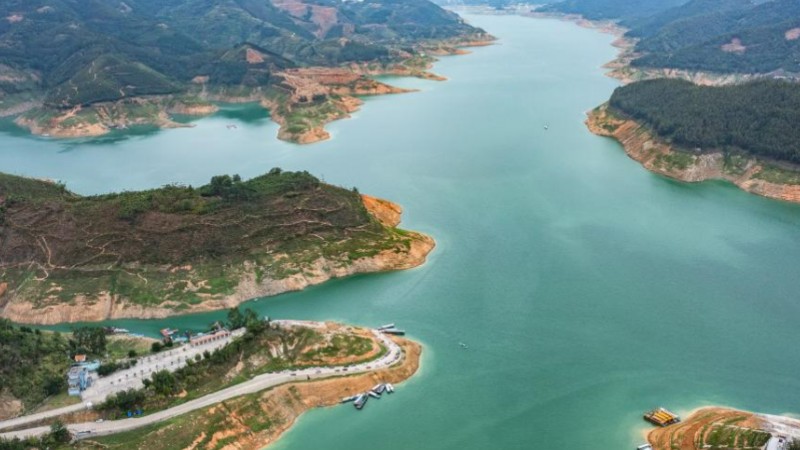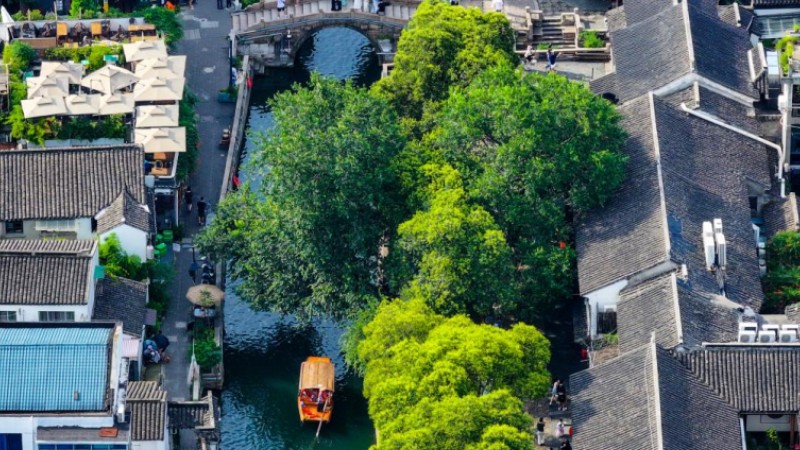IAEA chief 's visit to ROK sparks protests
Opposition party slams govt, UN nuclear agency report over Japan discharge plans
SEOUL — Hundreds of people marched in the Republic of Korea's capital on Saturday demanding Japan scrap its plans to release nuclear-contaminated water from the damaged Fukushima nuclear power plant, as the head of the UN nuclear agency met with senior officials in Seoul.
The protests came a day after the ROK's government formally endorsed the safety of the Japanese plans despite concerns over safety in many countries and signs of a consumer backlash at home. The announcement aligned with the views of the International Atomic Energy Agency, which gave its green light to the Japanese discharge plans last week.
Braving blistering summer heat and closely watched by police, the protesters walked in long lines through a commercial district in downtown Seoul, holding signs reading: "We denounce the sea disposal of Fukushima's nuclear wastewater!" and "We oppose with our lives the sea discharge." The marches proceeded peacefully and there were no immediate reports of major clashes or injuries.
"Other than discharging the water into the sea, there is an option to store the water on their land, and there are other options being suggested," said Han Sang-jin, spokesman of the Korean Confederation of Trade Unions, whose members accounted for many of the marchers.
He said that allowing Japan to discharge the water "is like an international crime".
The protests provided a tense backdrop to a meeting between IAEA Director General Rafael Mariano Grossi and ROK's Foreign Minister Park Jin to discuss the assessment.
Grossi on Sunday met with lawmakers from the opposition Democratic Party, which has harshly criticized the Japanese discharge plans and accused the conservative government of the ROK of putting people's health at risk while desperately trying to improve relations with Tokyo.
Health impacts neglected
The lawmakers harshly criticized IAEA's review, saying the report neglected the long-term environmental and health impacts of the nuclear wastewater release and threatens to set a bad precedent that may encourage other countries to dispose of nuclear waste into sea.
They called for Japan to scrap the discharge plans and work with neighboring countries to find safer ways to handle the nuclear wastewater, including a possible pursuit of long-term storage on land.
The party has also criticized the government of Yoon Suk-yeol, the ROK president, for putting people's health at risk while trying to improve relations with Japan.
"If you think (the nuclear-contaminated wastewater) is safe, I wonder whether you would be willing to suggest the Japanese government use that water for drinking or for industrial and agricultural purposes, rather than dumping it in the sea," Woo Wonshik, a Democratic Party lawmaker who attended the meeting, told Grossi. The party said Woo has been on a hunger strike for the past 14 days to protest against Japan's discharge plans.
In a statement released by state media on Sunday, the Democratic People's Republic of Korea also criticized the Japanese discharge plans, warning against a "fatal adverse impact on the human lives and security and ecological environment" resulting from the discharge of "nuclear-polluted water".
The statement, which was attributed to an unidentified official in the DPRK's Ministry of Land and Environment Protection, also criticized Washington and Seoul for backing the Japanese plans.
In Japan, several nonprofit organizations announced on Friday the launch of a marine protection project aimed at preventing the government's discharge plan.
The organizations, including the Citizens' Nuclear Information Center and the Japan Congress Against A- and H-Bombs, will start the project titled "Future of the Ocean" on July 17, which is recognized as "Marine Day" in Japan.
Through channels such as collecting signatures, creating websites and producing short videos, organizers hope the project will help spread opposition to the wastewater dumping plan both within and outside Japan, according to Masashi Tani, secretary-general of the Japan Congress Against A- and H-Bombs.
He stated that even if the government proceeds with the discharge into the sea, it will continue for several decades. "It shouldn't be assumed that once the discharge starts, there is no other option and giving up is the only choice," he added.
Photos
Related Stories
- S. Korea's opposition party slams IAEA report on Fukushima nuke wastewater discharge plan
- Japan must not take IAEA report to shield its ocean discharge
- S. Korea's opposition party stages overnight sit-in against Japan's nuke wastewater discharge plan
- IAEA report on Japan's nuclear-contaminated water discharge has limitations and partiality: Chinese official
- IAEA says report not endorsement to Japan's Fukushima nuke wastewater discharge plan
- IAEA report will not justify Japan discharge of nuclear-contaminated water: China
- IAEA report should not be "greenlight" for Japan's nuclear-contaminated water discharge: FM spokesperson
- Chinese FM meets with IAEA chief
- Chinese envoy calls for int'l discussion to address AUKUS-related proliferation risks
- Iranian president urges IAEA to adopt "professional" approach to Iranian nuclear issue
Copyright © 2023 People's Daily Online. All Rights Reserved.









